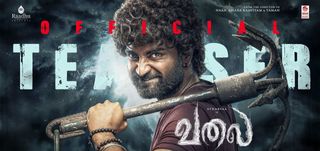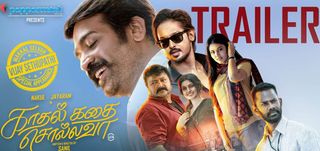Aayutham Seivom Movie Review
"Ayutham Seivom" means 'let us make weapons'. The underlying theme of the attractive storyline is that Gandhian peaceful satyagraha is more effective than any destructive weapon to ensure peace and law and order in society. Sundar C has done his character differently from his earlier roles as an action hero. The film goes to strengthen the ideal of 'ahimsa' which Gandhiji adopted as a weapon in the freedom struggle. The story-telling technique adopted by director Udhayan is commendable.
Saidai Sathya (Sundar C) is a hooligan who has scant respect for any law and is available for a price to commit any crime. One day he parks his car on the middle of the road and goes to sleep not bothering about the trouble the other road users are put to. Traffic constable Kandadasamy (Vivek), being on the side of Saidai Sathya, turns a blind eye to this traffic violation. A social activist and lawyer Udhayamoorthy (Vijayakumar) drags both Sathya and Kandasamy to court for obstructing traffic and causing nuisance. The court finds them guilty but instead of sentencing them to imprisonment, sends them to serve a term at the Madurai Gandhi museum for reformation. Joining them here is Meenakshi (Anjali), a college student.
On his discharge, Sathya lands a job of henchman. VBR (Manivannan), a villainous former minister, sends him to Udayamoorthy's place to pinch a confidential file containing vital evidence on the death of the Collector (Sukanya). While Sathya scrambles to get hold of the file, steel rods pierce through Udayamoorthy causing his death. Even while dying, Udayamoorthy blesses Sathya saying "Vazhga Valamudan" (Long Live). These last words of Udayamoorthy keep haunting Sathya and make him sleepless. Filled with remorse, he vows to carry on the good work of Udayamoorthy.
He gathers evidence to expose VBR who was behind the murder of the Collector Sukanya, but VBR's goons destroy the evidence by burning the documents. Undeterred by threats Sathya continues with his task of exposing VBR and bringing him to book. He adopts Gandhian principles of non-violence and peaceful satyagraha to accomplish his mission.
Sundar C climbs a new high in acting and depicts nicely how a rowdy turns a Gandhian. It is a laugh riot when he and Vivek go to Madurai Gandhi Museum as if it is a joyous tour. The defining moment comes when he gets interested in Gandhiji's "Experiments with Truth" a day after he confronts a group of men for making fun of the Gandhians. Sundar-Malavika episodes in the museum regale the viewers.
It is thoughtful that after giving the impression that he would never change, Sundar suddenly becomes a Gandhian. Instead of reverting to his old ways, he undertakes a fast demanding action against Manivannan for killing the Collector. What starts as a fast by an individual becomes a movement with an 80-year-old tyagi (Nasser) and all shop-keepers in the area joining it. Sundar shines in these sequences. He starts his 15-minute fierce fight with Manivannan's man, Ponnambalam, with the filmi-style dialogue "Now I change as Saidai Sathya". His performance amounts to giving fresh confidence to people on the Gandhian principles.
Napoleon plays an IPS officer who wants to avenge his brother Manivannan's death. He attacks Sundar but later apologizes to him when he explains the reasons. By his performance he sets an example to real police officers.
Vivek, who shares equal screen space as that of Sundar, is not as best as one expects of him.
There is not much to speak of Anjali's role as heroine. She is used for only dancing and a little romancing.
Nasser (Tyagi), Manivannan (villain) Sukanya (collector in cameo), "Annachi" G.M. Kumar and Vijayakumar (social activist/lawyer) fit their roles.
Srikanth Deva's music is average. Selvaraj's camerawork adds strength to the film.
In the second half of the film, the tempo slows down and the climax is not as gripping as it ought to be. The director has taken the commerc



















